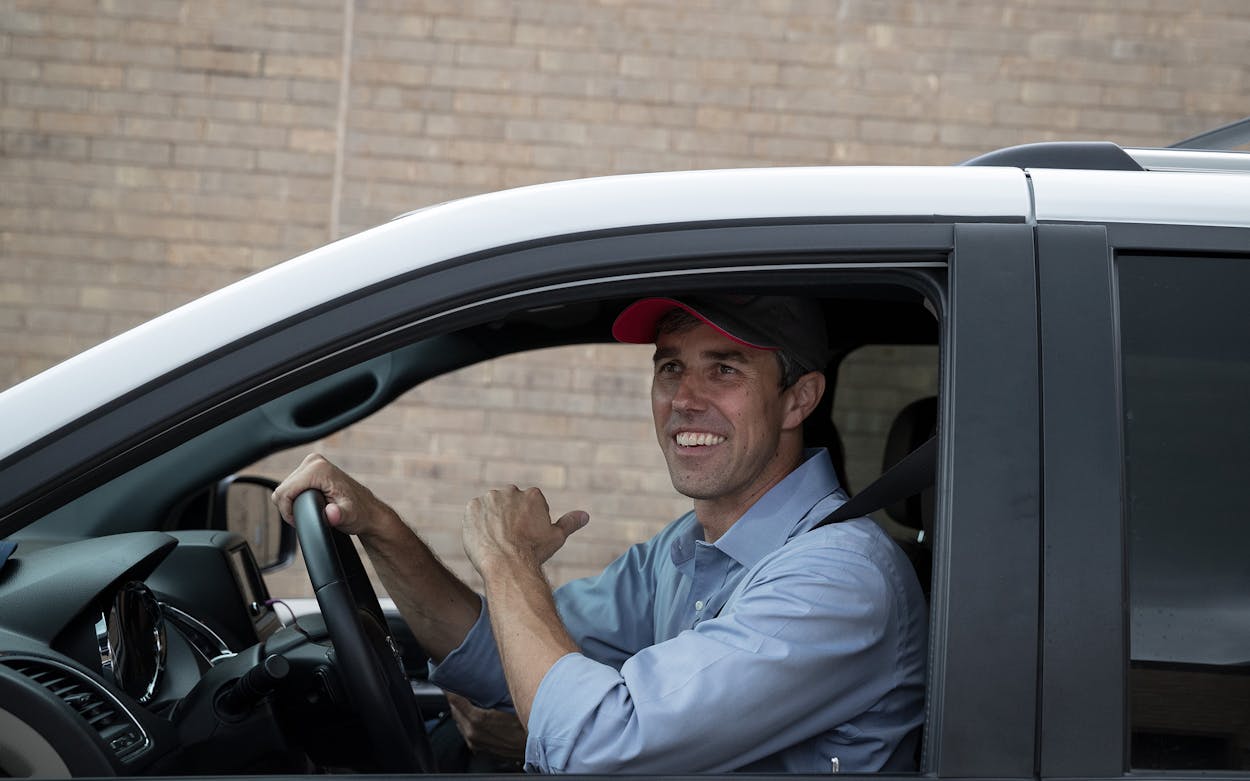On Friday morning, Beto O’Rourke released his final quarterly fundraising report of the 2018 campaign cycle. Given the national attention he earned after going viral in August with his response to a question about kneeling NFL players—and his subsequent role as a bonafide media darling, appearing on shows like Ellen and The Late Show with Stephen Colbert—it’s not a surprise that his numbers are impressive. What is a surprise is just how impressive they are. His third-quarter tally is a staggering $38.1 million—a record-setting number that eclipses not just Ted Cruz’s take, but any previous fundraising records for a Senate candidate in this country.
Those numbers don’t always translate to success on election day. Not counting the $22 million take of Florida governor Rick Scott earlier this year ($14 million of which came from his own personal funds), the previous record-holder was Republican Rick Lazio, who in 2000 raised nearly $22 million in a single quarter when running for a New York senate seat against Hillary Clinton. Lazio lost the race by 12 points. And it raises a big question for O’Rourke: He’s got the money to do just about anything he wants between now and election day—but with just three and a half weeks to go, what’s the best way to utilize these massive resources to close a gap in the polls that, as of this week, looks to be about nine points?
There are a few potential answers to that question. In a press release announcing the haul, O’Rourke’s campaign said that they’re launching a “weekend of action” in which they intend to knock on 102,733 doors and make 102,733 phone calls. (That number is the exact capacity of Texas A&M’s Kyle Field, the largest stadium in Texas—perhaps a response to Trump’s vow in August to hold a rally for Ted Cruz in “the biggest stadium we can find.”) Those doors can be knocked on and those calls can be made by volunteers, but also by paid staff hired out of those record fundraising dollars. The campaign can use the money to stake into the ground more of the “Beto for Senate” signs that have become ubiquitous in certain parts of the state. It’ll pay for gas for the well-publicized pickup truck O’Rourke has driven from campaign rally to campaign rally. It can buy stamps for direct mail, or pay for radio, print, and TV advertising in Texas’s nearly twenty distinct (and often expensive) media markets.
It can also buy him more digital advertising, a form of spending that his campaign has invested more money in than any Senate candidate by a wide margin. On Facebook, O’Rourke’s campaign alone has outspent the entire 2018 Senate field—Democrats and Republicans combined—by nearly 30%. Digital ads were considered instrumental to Trump’s 2016 victory.
Much of the efficacy of O’Rourke’s fundraising haul will be determined by the infrastructure his campaign already has. The press release says that he’s built “the largest field operation in Texas history,” and his campaign currently employs about 300 staffers, a huge number. That could give him a place to put the additional short-term workers these numbers would allow him to bring in for a final push. Three and a half weeks is an eternity in politics, but a short time in the world of recruiting, hiring, training, and deploying workers—a challenge of the O’Rourke campaign will probably be to split the difference.
In the meantime, the Cruz campaign raised $12 million over the same period. That number highlights just how remarkable O’Rourke’s tally was. A $12 million take would have set a new record in a Senate race in Texas, except that O’Rourke just tripled it. The Cruz campaign has promised to address O’Rourke’s fundraising total at a campaign event in Houston later today—we can presume that one line of criticism he’ll take is that O’Rourke is the candidate favored by coastal elites, “limousine liberals” (like, er, Stephen King), and other non-Texan entities. All of that is true, of course—Ellen Degeneres and Stephen Colbert won’t be casting a vote in the race next month—but the O’Rourke campaign seems to have anticipated that line, noting in its release that, “with a majority of the fundraising coming from Texas,” this was the sixth time he’s out-raised Cruz—meaning the numbers have been strong (if not by the same record pace) throughout a period during which he was better known in El Paso than Hollywood.
In any case, the main takeaways from these numbers are that O’Rourke has resources to deploy against Cruz that no Texas Democrat has ever had before, and that he’s excited enough Democrats that, win or lose, he’s likely to be a force in the party’s future going forward. Whether any of that is enough to make him Texas’s next Senator is a question to be answered in three and a half weeks—but for the moment, he’s got all of the money in the world to keep it a competitive race.
- More About:
- Politics & Policy
- Ted Cruz
- Beto O'Rourke








